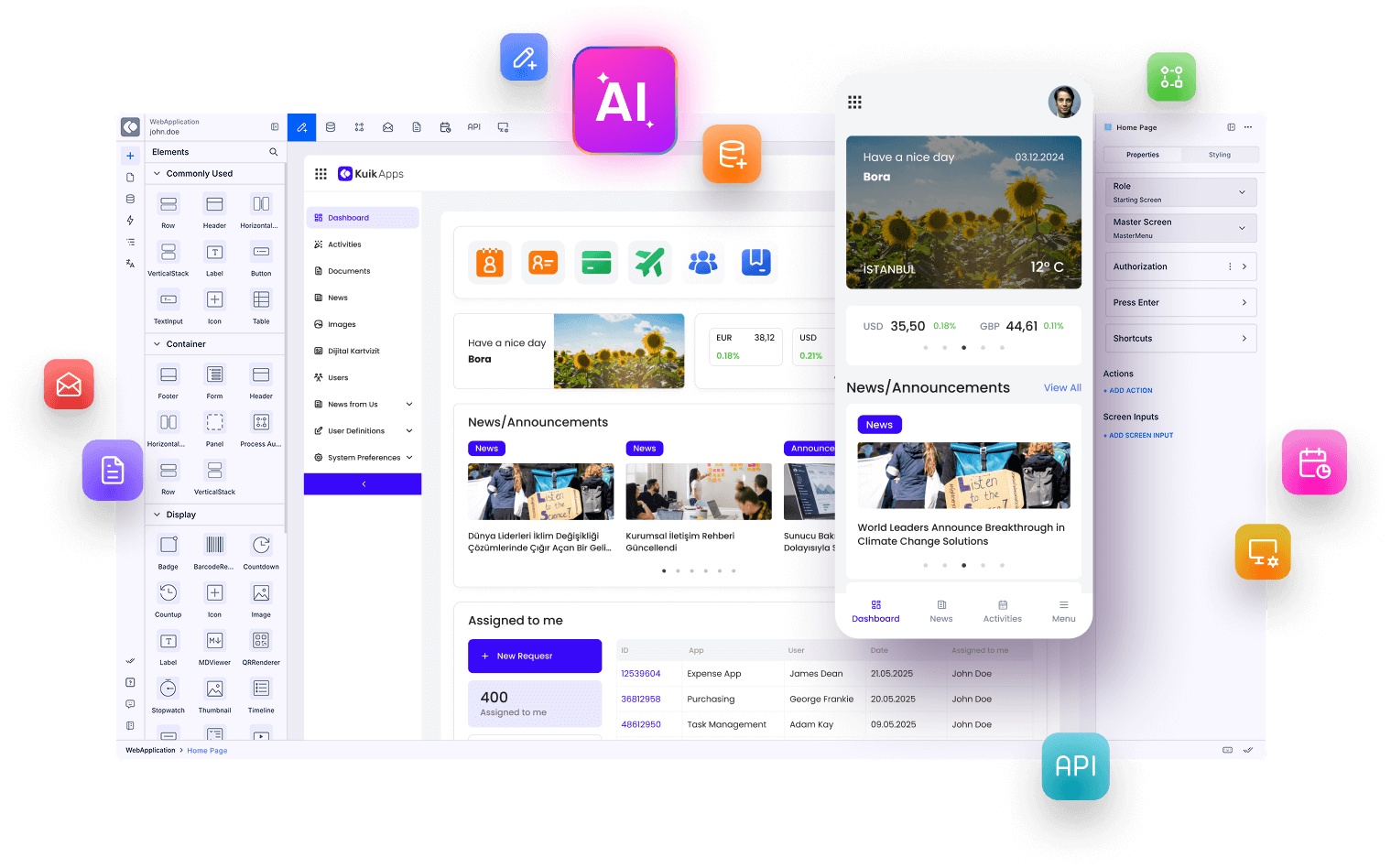By the end, you should have a better understanding of what low code is, how it can benefit your organization, and what factors to consider when choosing a platform. So let's get started!
What you need to know about low-code
Here is what you need to know about the low-code approach to development.
1. What is low code?
Low code is an approach to development that requires no hands-on coding. Instead, it operates on basic logical principles built on low-code platforms with visual tools such as drag&drop.
Low-code developers just need to create the algorithm to be executed, not its code. The built-in tools in low-code platforms take care of the latter. That being said, some platforms allow developers to add custom code to their applications.
As low code requires no hard coding experience, an average citizen with critical thinking skills and platform know-how can easily contribute to the development process of an application.

2. What is the difference between low-code and no-code?
Although low-code and no-code are similar in some ways, they have main differences. Basically, the difference between low-code and no-code is human intervention.
While developers can add hard code and change the built-in codes in the low-code approach, this is not possible in no-code, where developers solely use pre-built configurations.
This distinction makes low-code a more liberating approach to development than no-code, as the former offers more freedom for developers to customize their applications.
3. What can you build with low-code?
Thanks to low-code development platforms, you can build almost any web and mobile application. You can realize your vision as a solopreneur without the technical know-how, regardless of the platform. Or you can also build sophisticated apps customized for your company goals.
Here are some of the things you can build with low code:
- Application programming interfaces (API)
- Native mobile applications
- Web applications
4. What can you use low-code for?
Thanks to low code, you can also create tools that optimize your business practices, such as:
- Field services,
- Process automation,
- Application modernization,
- Case management.
As you can easily build omnichannel solutions with low code, it’s easier than ever to optimize your business practices with applications that prevent the inefficiency brought about by data fragmentation and problems in coordination.

5. Which industries can benefit from low-code?
The universal use cases of low-code can be utilized regardless of your line of business. Therefore, you can find a way to benefit from low code, whatever industry you’re in.
- Local Governments,
- Travel, Leisure and Entertainment,
- Insurance,
- Computer and Technology,
- Retail Banking and Financial Services,
- Higher Education, and more.
Check out what low-code has to offer for various industries.
6. What are the benefits of low-code?
The short answer would be:
- Faster Time-to-Market
- Enhanced Agility
- Accelerated Code Quality & WYSIWYG
- Lower Costs
Low code comes in handy in many aspects of development. For example, it is much faster to build with low code. Low code is shown to be 40% to 60% faster than its traditional counterpart.
In addition to that, building with low-code costs less money. You do not need to hire more specialists to do hard code because people without technical know-how can also contribute to the process. This also allows the department outside of IT to have a say in app development, to which we’ll come right now.
7. What is a “citizen developer”?
A citizen developer is someone outside of IT who creates business applications or updates the existing ones thanks to low code or no code. With that said, you should keep in mind that being a citizen developer does not entail a title in a company. It means being able to assist with reducing the IT backlog by virtue of using the required tools.
Thanks to the citizen development approach powered by low/no-code, coding is a much more democratized process that anyone can contribute to, no matter their technical level or department.
8. Will low code deprecate developers?
No. Just because low code allows non-developers to build applications doesn’t mean it will make developers obsolete.
Low-code applications are generally designed to solve a specific problem within a specific framework. Therefore, low code won’t deprecate developers. Instead, it will allow developers to focus on more important tasks by eliminating their errands. This means we still need developers to handle tasks that require more customization.
9. What are the disadvantages of low-code? What should I keep in mind before using it?
Low code is an invaluable alternative to coding when used under the right circumstances, although you might still need to utilize hard code in other conditions.
Before diving in, you must be comfortable with how your solution fares against those possible problems.
- Security: When you use low-code platforms, you rely on your vendor to provide you with security tools for development. The less control you have over your application, the less secure it becomes.
- Vendor Lock-in: Many applications built with low code are prone to vendor lock-in, which is the case when you cannot use your end product because of its incompatibility with other platforms.
- Flexibility: Only some low-code development platforms have enough flexibility to offer in their interfaces. As they lack agility, you might need help customizing your application to meet your expectations.
With Kuika’s low-code platform, you can easily build agile and customizable applications tailored to your needs.
If we have cleared up your confusion, you can start creating the applications of your dreams in the fast and unlimited world of low code with Kuika.
















